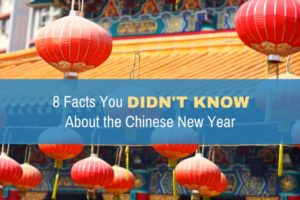It's the middle of February already, and the new year is no longer new. But not according to the Chinese lunar calendar. In fact, Chinese New Year celebrations start this week! With that in mind, here are 8 things you probably didn't know about Chinese language, culture, and the Chinese New Year.
2018 is the Year of the Dog.
The Chinese zodiac system runs on a 12-year cycle. Each year is associated with a particular zodiac animal. 2018 is the Year of the Dog. More specifically, it's an "Earth Dog" year. According to Chinese astrology, babies born in 2018 will be serious and stubborn. They will also be responsible and good communicators.
Famous "Earth Dogs" include Madonna and Michael Jackson.
The Chinese New Year lasts for two weeks.
This year, Chinese New Year preparations kick off on February 8th. The New Year itself starts on February 16. The celebration officially begins on New Year's Eve and will last until the Lantern Festival on March 2nd.
The Chinese New Year is also called the Spring Festival because it celebrates the end of winter and the beginning of spring.
Just as in Western cultures, the Chinese New Year includes rituals for wealth and good fortune in the year to come.
In the United States, we eat black-eyed peas and greens. In Spain, they eat 12 grapes at midnight. It should come as no surprise, then, that the Chinese New Year has its own set of rituals and superstitions.
For example, there's no showering on New Year's Day, lest you wash away your good luck. Also, you'd better clean your house before New Year's Eve, to clean out any bad luck that accumulated during the previous year and make room for a fresh start.
The color red is everywhere. As the color of fire, it symbolizes good fortune and happiness. Older relatives give children gifts of red envelopes with money inside. For relatives who live far away, this custom has been updated for the modern era with "red envelope apps" that make it easy to give and receive money.
New clothes also bring good luck, especially if they're red!
Traditional lion dances and dragon dances are not only amazing to watch, but they also bring good luck to participants and bystanders.
There are also special foods that ensure good fortune. For example, Nian Gao (年糕) rice cakes symbolize success. Meanwhile, miniature sponge cakes called fa gao (发糕) symbolize wealth.
In Chinese culture, items can symbolize good luck or bad luck if they sound like other words with good or bad connotations.
For example, the number "8" is pronounced like the word for "prosperity," so it's considered lucky. The number 4 is pronounced like the Chinese word for "death," so most Chinese people avoid it when possible.
Many "lucky" Chinese New Year's foods sound like Chinese words that relate to luck, fortune, and prosperity.
Traditional New Year's greetings emphasize happiness, prosperity, and good fortune.
In Chinese culture, a variety of traditional greetings and "auspicious phrases" are used to greet people during the New Year celebrations. Here are a few of the most common:
- Xīnnián kuàilè (Mandarin): Happy New Year!
- Chūnjié kuàilè (Mandarin): Happy Spring Festival!
- Kung hei fat choi. (Cantonese): Happiness and prosperity!
- Gōngxǐ fācái (Mandarin): Happiness and prosperity!
- Gǒunián jíxiáng (Mandarin): Good luck this Dog year!
- Shēngyì xīnglóng (Mandarin): Prosperous business
Forget the Fourth of July, the world's biggest fireworks event is Chinese New Year's Eve.
So many fireworks are set off, the skies in Beijing go black with smoke. The Chinese government periodically tries to ban fireworks in cities to protect the air quality, but people set them off regardless.
Where did the tradition of setting off fireworks come from? According to an ancient Chinese myth, there was once a Chinese village that was terrorized by a child-eating monster called the Nian. One night, as all of the other villagers hid from the beast, an old man decided to try to scare it off by decorating with the color red and setting off fireworks all night. His plan was a success. Ever since, the Chinese have celebrated the New Year with firecrackers and red lanterns, to frighten away bad luck and evil spirits.
Everyone comes home for New Year's Eve dinner.
And we do mean everyone. In fact, so many people travel across modern China for the New Year that the Chinese refer to it as chunyun (春运), or Spring Migration. It's the most massive human migration in the world. Want to see it on a map? Check out these visualizations from Baidu!
The Chinese New Year is celebrated around the world.
Chinese New Year celebrations aren't just limited to China. The Chinese New Year is celebrated as a public holiday in Malaysia and Singapore, for example. Large, colorful Spring Festival celebrations also take place in cities like London, England; Sydney, Australia; and San Francisco, California.
Did you know that Mandarin Chinese is the most widely-spoken language in the world? Chinese translation services can help your business reach new customers and communicate more effectively with existing customers.
But to do that, you need content that's both translated correctly and culturally appropriate. VIA can help. Contact us today at 1-800- 737-8481 to learn more about our award-winning translation process and our expert translators.
Chinese, Chinese New Year, Mandarin

